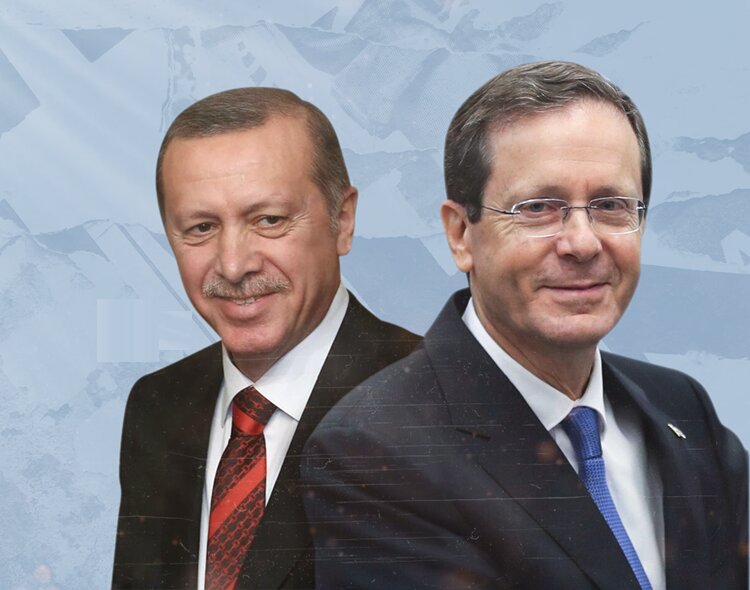On Erdogan’s phone call with Israeli president

TEHRAN – In a diplomatic turnabout that shocked, and in some cases disappointed, many in the region including Turkey’s allies, Turkish President Recep Tayyip Erdogan spoke by phone with Israeli President Isaac Herzog after over a decade of Israel-bashing rhetoric from Ankara.
During the phone conversation, “President Erdogan underscored that Turkey-Israel relations were of great importance in terms of security and stability in the Middle East [West Asia], and that there was a great potential for cooperation” between Ankara and Tel Aviv “in various areas, notably energy, tourism and technology,” according to a statement put out by the Turkish presidency.
“Pointing out that the bilateral trade volume increased despite the pandemic, President Erdogan said that it was of mutual interest to benefit from that potential,” the statement continued.
Herzog’s office also issued a similar statement, saying, “The presidents emphasized in their call that the ties between Israel and Turkey are of great importance to the security and the stability of the Middle East.”
The Israeli readout also noted that Erdogan and Herzog underlined “the great importance of maintaining contact and ongoing dialogue despite the differences of opinion, with the goal of making positive steps toward a solution to the Israeli-Palestinian conflict, which will also contribute to the improvement of Israeli-Turkish relations.”
The 40-minute call came against a backdrop of a renewed Turkish desire for mending ties with Israel and some other countries such as Egypt and Saudi Arabia. Erdogan had already spoken by phone with Saudi King Salman bin Abdulaziz. Meanwhile, Turkish diplomats have been busy negotiating a deal to restore ties with Cairo. Turkey’s effort with regard to the restoration of ties with Egypt ended in failure given the deep mistrust between Cairo and Ankara because of the latter’s support of the Muslim Brotherhood, a group that has been at loggerheads with the Egyptian government ever since the ouster of former Egyptian President Mohammad Morsi. And the level of Ankara’s ties with Riyadh didn’t measure up to Turkish expectations.
Then Turkey turned to Israel. Although they were strained for more than ten years, Israel-Turkey relations had never been brought to a total halt. Tourism and trade ties between the two never stopped even when Erdogan was launching into vociferous diatribes against Israeli leaders for murdering Palestinian children and pummeling Palestinian homes with airstrikes.
Now, Erdogan seems to be aspiring to have better relations with Israel, even though his country and he himself have been touting themselves as the champions of defending the Palestinian cause. “Our heart desires that we can move our relations with [Israel] to a better point,” Erdogan said in December 2020, adding, “Our relations with Israel on intelligence have not ceased anyway, they are still continuing.”
The Turkish president implied at the time that the improvement of his country’s ties with Israel hinged on the change of some Israeli people “at the top,” a reference to then-Israeli Prime Minister Benjamin Netanyahu, whose relations with Erdogan deteriorated to a rarely seen level. With Netanyahu gone and new Israeli leadership taking office, Erdogan saw an opportunity for better relations with a regime he kept denouncing its “terrorism” against the Palestinians. During the May flare-up between Israel and the Gaza Strip, Erdogan castigated Israel for their careless ill-treatment of the Palestinians.
These positions, and earlier rebukes, often pulled on the heartstrings of millions of ordinary Arabs across the Arab world. Many of them still proudly remember how then-Prime Minister Erdogan grilled then-Israeli President Shimon Peres at the World Economic Forum in 2009. “When it comes to killing, you know very well how to kill. And I know very well how you killed children on the beaches,” Erdogan angrily told Peres in an intense argument over Israel’s war on Gaza, and then walked off the stage.
Turkish officials knew how to earn praise from Arab public opinion. With every Israeli-Palestinian flare-up, they quickly seized on the opportunity to receive a standing ovation in the Arab world.
This, however, may soon come to an end. For millions of Arabs, the Palestinian cause is not something to be measured with economic potentials. Erdogan may succeed in persuading his fellow compatriots that renewed ties with Israel would result in economic benefits for Turkish citizens, but he can never justify his ties with Israel to millions of Arabs who thought that they finally found a leader who can rise up against the Israeli oppression.
The Turkish government seems to be aware of this issue and has taken precautionary measures by underlining that Turkey would continue to support the Palestinians. Earlier this week, Erdogan met with Palestinian President Mahmoud Abbas in Istanbul. “During the meeting, President Erdogan underlined that Turkey will not remain silent to Israel’s oppression in Palestine and that lasting peace and stability cannot be established in the region so long as Israel continues its policies of occupation and annexation,” according to a Turkish readout of the meeting. “Turkey will continue to support intra-Palestinian reconciliation efforts, the President further stressed, expressing his pleasure over the positive course of the bilateral relations in every area extending from economy and trade to culture, education and tourism.”
